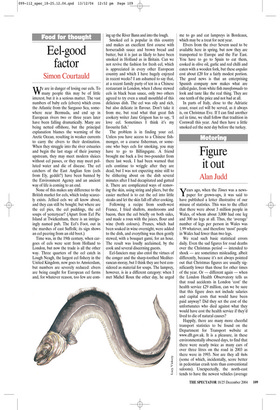Eel-good factor
Simon Courtauld
We are in danger of losing our eels. To many people this may be of little interest, but it is a serious matter. The vast numbers of baby eels (elvers) which cross the Atlantic from the Sargasso Sea, somewhere near Bermuda, and end up in European rivers two or three years later have been falling dramatically. Many are being netted offshore, but the principal explanation blames the warming of the Arctic Ocean, resulting in weaker currents to carry the elvers to their destination. When they struggle into the river estuaries and begin the last stage of their journey upstream, they may meet modern sluices without eel passes, or they may meet polluted water and die of disease. The eel catchers of the East Anglian fens (eels from Ely, geddit?) have been banned by the Environment Agency and an ancient way of life is coming to an end.
None of this makes any difference to the British market for eels, which today scarcely exists. Jellied eels we all know about, and they can still be bought; but where are the eel pies, the eel puddings, the eel soups of yesteryear? (Apart from Eel Pie Island at Twickenham, there is an intriguingly named pub, The Eel’s Foot, out in the marshes of east Suffolk; its sign shows an eel peering from an old boot.) Time was, in the 19th century, when cargoes of eels were sent from Holland to London, but now the trade is all the other way. Three quarters of the eel catch in Lough Neagh, the largest eel fishery in the United Kingdom, now goes to Amsterdam, but numbers are severely reduced: elvers are being caught for European eel farms and, for whatever reason, too few are com ing up the River Bann and into the lough.
Smoked eel is popular in this country and makes an excellent first course with horseradish sauce and brown bread and butter, but it is just as likely to have been smoked in Holland as in Britain. Can we not revive the fashion for fresh eel, which is appreciated in every other European country and which I have hugely enjoyed in recent weeks? I am ashamed to say that, at a recent family party of ten in a Chinese restaurant in London, when I chose stewed eels in black bean sauce, only two others agreed to try even a small mouthful of this delicious dish. The eel was oily and rich, but also delicate in flavour. Don’t take it from me, but read what that great fish cookery writer Jane Grigson has to say, ‘I love eel. Sometimes I think it’s my favourite fish.’ The problem is in finding your eel. Unless you have access to a Chinese fishmonger, or a coarse fisherman, or someone who buys eels for smoking, you may have to go to Billingsgate. A friend brought me back a live two-pounder from there last week. I had been warned that eels continue to wriggle after they are dead, but I was not expecting mine still to be slithering about on the dish several minutes after I had decapitated and gutted it. There are complicated ways of removing the skin, using string and pliers, but the easier method is to cut the eel into little steaks and let the skin fall off after cooking.
Following a recipe from south-west France, I fried shallots, mushrooms and bacon, then the eel briefly on both sides, and made a roux with the juices, flour and wine (both colours). Prunes, which had been soaked in wine overnight, were added to the dish, and everything was then gently stewed, with a bouquet garni, for an hour. The result was loudly acclaimed, by the cook and several discerning guests.
Eel-fanciers may also extol the virtues of the conger and the sharp-toothed Mediterranean moray, but I think they are best considered as material for soups. The lamprey, however, is in a different category: when I met Michel Roux the other day, he urged me to go and eat lampreys in Bordeaux, which may be a treat for next year.
Elvers from the river Severn used to be available here in spring, but now they are transported to Europe and the Far East. You have to go to Spain to eat them, cooked in olive oil, garlic and red chilli and eaten with a wooden fork, but these angulas cost about £20 for a fairly modest portion. The good news is that an enterprising Spanish company now makes what are called gulas, from white fish transformado to look and taste like the real thing. They are one tenth of the price and not bad at all.
In parts of Italy, close to the Adriatic coast, roast eel will be served, as it always is, on Christmas Eve. If I can find another eel in time, we shall follow that tradition in Cornwall this year. And then have a little smoked eel the next day before the turkey.

















































































 Previous page
Previous page